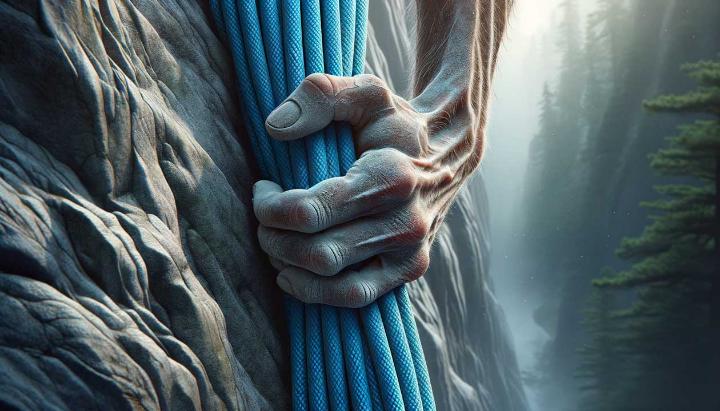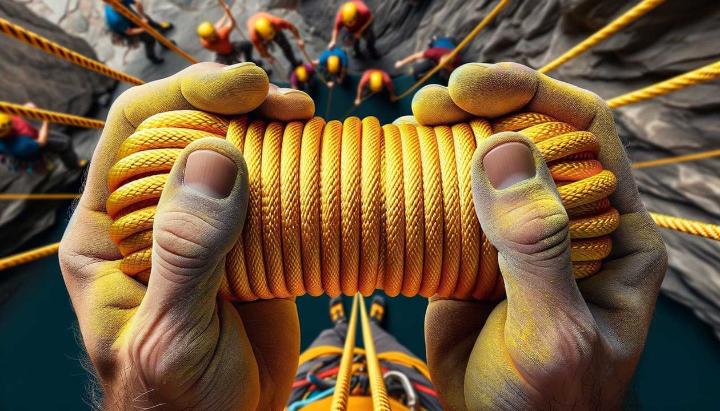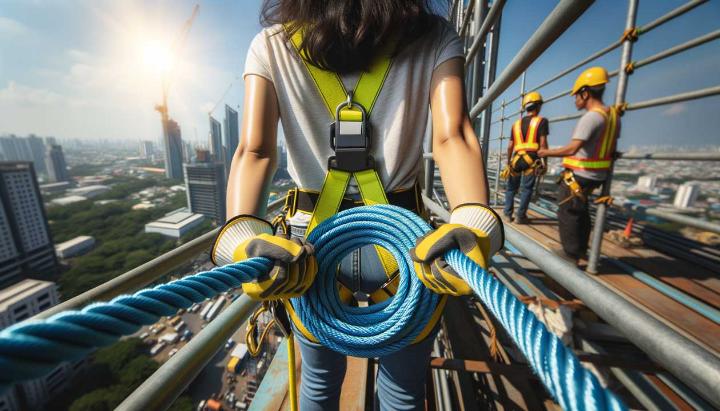Have you ever wondered why some ropes last for years while others fray within weeks? The secret lies in the innovative world of high-quality coated and CWC ropes. At iRopes, we're not just selling cordage; we're revolutionising the way industries approach durability and performance in their rope applications.
Imagine a rope that's 15% more abrasion-resistant than anything else on the market. That's not just a promise; it's our reality. Our exclusive imported coating, applied with a proprietary blend, sets a new standard in rope longevity. But why should you care about rope durability?
Whether you're rigging heavy machinery, securing cargo on a ship, or scaling treacherous cliffs, the strength and reliability of your rope can mean the difference between success and catastrophe. In this post, we'll dive deep into the world of CWC rope, coated rope, and hollow rope technology. You'll discover how these innovations are transforming industries from off-road adventures to defence applications, and why choosing the right rope is crucial for your safety and efficiency.
Get ready to unravel the mysteries of modern rope technology and learn how iRopes' cutting-edge solutions can elevate your operations to new heights. Are you prepared to leave frayed edges and frequent replacements in the past? Let's explore the future of rope durability together.
Understanding CWC Rope: Strength and Versatility
When it comes to high-performance ropes, CWC (Continuous Wound Copolymer) rope stands out as a game-changer in the industry. As a rope enthusiast with years of experience, I've seen firsthand how CWC rope has revolutionised the way we approach challenging rope applications.
CWC rope is a marvel of modern engineering, combining the best qualities of various materials to create a rope that's both incredibly strong and remarkably versatile. But what exactly makes CWC rope so special?
Types of CWC Rope: From Blue Steel to Polypropylene
The CWC rope family boasts an impressive range of options, each tailored to specific needs. Let me walk you through some of the most popular types:
- CWC Blue Steel: This is the heavyweight champion of the CWC world. It's one of the strongest copolymer ropes available, offering unparalleled durability and strength.
- CWC Polypropylene: A more cost-effective option that doesn't skimp on performance. It's particularly popular in marine applications due to its excellent buoyancy.
- CWC Nylon: Known for its exceptional elasticity, this variant is perfect for applications where shock absorption is crucial.
Did You Know?
CWC Blue Steel rope has twice the wear life of standard polypropylene!
Applications and Benefits of CWC Rope
The versatility of CWC rope makes it a go-to choice across various industries. Here are some key benefits that make CWC rope stand out:
- Superior strength-to-weight ratio: CWC ropes offer impressive strength without the bulk, making them ideal for applications where weight is a concern.
- Excellent abrasion resistance: Whether you're working on a construction site or out at sea, CWC rope can withstand harsh conditions and frequent use.
- UV and chemical resistance: CWC ropes maintain their integrity even when exposed to sunlight and various chemicals, ensuring longevity in outdoor applications.
- Low elongation: This property makes CWC ropes perfect for precise load control in industrial settings.
From marine operations to heavy industry, CWC rope has proven its worth time and time again. I remember a particularly challenging project where we needed a rope that could handle heavy loads in a corrosive environment. CWC Blue Steel was the clear winner, outperforming traditional options by a significant margin.
As you consider your rope needs, ask yourself: What specific challenges does your application present? How important are factors like strength, weight, and durability in your context? Understanding these aspects will help you choose the right CWC rope for your needs.
In the next section, we'll delve deeper into the construction and materials that make CWC rope such a powerhouse in the world of high-performance ropes. Stay tuned!
Benefits of Coated Rope: Enhancing Performance and Durability
As a rope enthusiast who's spent years working with various types of cordage, I can confidently say that coated ropes are a game-changer in the industry. The coating process adds a layer of protection that significantly enhances a rope's performance and longevity, making it an invaluable choice for numerous applications.
Types of Rope Coatings and Their Advantages
Let's dive into the world of rope coatings and explore how they can benefit your specific needs:
- PVC coating: This versatile coating offers excellent protection against abrasion and UV damage. I've seen PVC-coated ropes withstand harsh marine environments for years, maintaining their strength and flexibility.
- Nylon coating: Known for its superior strength-to-weight ratio, nylon coatings provide excellent abrasion resistance. In my experience, nylon-coated ropes are particularly useful in industrial applications where frequent handling is required.
- Dry treatments: These specialised coatings are a favourite among climbers and outdoor enthusiasts. They increase water resistance and prevent dirt infiltration, extending the rope's lifespan in challenging conditions.

At iRopes, we've taken rope coating to the next level. Our imported coating, applied with a proprietary blend, increases abrasion resistance by 15% compared to competitor products. This means your ropes will last longer and perform better in demanding situations.
Applications of Coated Rope in Various Industries
Coated ropes have found their way into numerous industries, solving unique challenges and improving safety and efficiency:
- Marine industry: PVC-coated wire ropes resist corrosion and maintain strength in saltwater environments. I've witnessed these ropes outlast traditional options by years in offshore applications.
- Construction: Abrasion-resistant coatings extend the life of ropes used in heavy lifting and rigging operations. The added durability translates to cost savings and improved safety on job sites.
- Recreational climbing: Dry-treated ropes have revolutionised climbing safety, especially in wet conditions. As an avid climber, I can attest to the peace of mind these ropes provide when tackling challenging routes.
When selecting a coated rope for your application, consider factors such as the environment, load capacity, and frequency of use. The right coating can significantly enhance your rope's performance and longevity, ensuring you get the most out of your investment.
Have you considered how a coated rope could improve your operations? Whether you're working on a construction site, sailing the high seas, or scaling a rock face, there's likely a coated rope solution that can elevate your experience and safety.
Hollow Rope Technology: Advanced Materials and Applications
As a rope enthusiast with years of experience in the industry, I've witnessed firsthand the evolution of rope technology. One of the most exciting developments in recent years has been the advent of hollow rope technology. This innovative approach to rope construction has revolutionised the way we think about strength, flexibility, and versatility in cordage.
Understanding Hollow Braid Rope Construction
Hollow braid rope, as the name suggests, is constructed without a core. Instead, it's typically made up of 8, 12, or 16 strands woven into a tubular structure. This unique construction method results in a rope that's both lightweight and incredibly strong.
The materials used in hollow braid ropes are just as impressive as their construction. Common materials include:
- Polypropylene: Known for its excellent buoyancy and resistance to water absorption, making it ideal for marine applications.
- Nylon: Prized for its strength and elasticity, perfect for applications requiring shock absorption.
- Technora fiber: A high-performance aramid fiber that offers exceptional strength and heat resistance.

Benefits of Hollow Rope in Various Industries
The unique properties of hollow rope make it a versatile solution across multiple industries. Here are some key advantages:
- Lightweight yet strong: The hollow construction allows for a high strength-to-weight ratio, making it ideal for applications where every gram counts.
- Easy to splice: The hollow core makes it simple to create custom eye splices or join ropes together, a crucial feature in many marine and industrial applications.
- Excellent abrasion resistance: The braided construction distributes wear evenly, resulting in longer-lasting ropes.
I've seen hollow ropes excel in various scenarios. For instance, in arborist rigging, where precision and safety are paramount, hollow ropes have become the go-to choice. Their low stretch and easy splicing properties make them perfect for creating secure anchor points high up in trees.
In the marine industry, hollow polypropylene ropes have revolutionised mooring lines. Their buoyancy and resistance to water absorption mean they're less likely to sink and tangle, making docking and undocking smoother and safer.
For climbers, hollow core ropes offer an exciting balance of lightweight design and high strength. I remember chatting with a professional climber who swore by her hollow core rope, praising its ability to handle repeated falls without compromising safety.
Did you know? Hollow braid technology allows for the creation of "double braid" ropes, where a second rope is fed through the hollow core, combining the strengths of two different materials.
As we continue to push the boundaries of what's possible in rope technology, hollow rope construction stands out as a true game-changer. Whether you're scaling a mountain, rigging a sail, or securing heavy machinery, there's likely a hollow rope solution that can enhance your experience and safety.
Have you had any experience with hollow ropes in your work or hobbies? I'd love to hear about how they've impacted your operations or adventures. And if you haven't tried them yet, what applications do you think could benefit from this innovative technology?
Choosing the Right Rope for Your Application
As a rope specialist with years of experience, I can't stress enough how crucial it is to select the perfect rope for your specific needs. The right choice can mean the difference between a successful project and a potential disaster. Let's dive into the world of rope selection and uncover the secrets to making an informed decision.
Types of Ropes and Their Characteristics
Before we delve into the selection process, it's essential to understand the main categories of ropes available:
- Wire rope: Exceptionally strong and durable, ideal for heavy-duty industrial applications like crane operations and mining.
- Synthetic fiber rope: Lightweight and versatile, perfect for a wide range of uses from marine to recreational activities.
- Natural fiber rope: Biodegradable and environmentally friendly, often used in landscaping and decorative applications.
Each type has its unique properties, strengths, and limitations. For instance, I once worked on a maritime project where we initially considered wire rope for its strength. However, we ultimately opted for a synthetic fiber rope due to its superior corrosion resistance in the salt water environment.
Factors to Consider When Selecting a Rope
When it comes to choosing the right rope, there are several crucial factors to keep in mind:
- Strength requirements: Calculate the maximum load your rope needs to bear, including safety factors. Remember, it's always better to err on the side of caution.
- Environmental conditions: Consider exposure to UV rays, chemicals, and moisture. A rope that performs well in a dry warehouse might deteriorate quickly in a marine setting.
- Abrasion resistance: If your rope will be subjected to frequent rubbing or scraping, prioritize materials known for their durability.
- Shock absorption: For applications involving sudden load changes, like fall protection, choose ropes with good elastic properties.

Let's not forget about rope diameter and construction. These factors significantly impact a rope's performance. For example, a thicker rope generally offers more strength, but it may sacrifice flexibility. The lay of the rope (how it's twisted or braided) affects its handling characteristics and resistance to unraveling.
I recall a challenging project where we needed a rope for a pulley system in a corrosive industrial environment. We ended up choosing a synthetic rope with a special coating that increased its abrasion resistance by 15% compared to standard options. This decision proved invaluable, as the rope maintained its integrity far longer than expected, saving time and resources on replacements.
Expert Tips for Rope Selection and Maintenance
To help you make the best choice and extend the life of your rope, consider these professional tips:
- Always overestimate your strength requirements: It's better to have a rope that's too strong than one that's not strong enough.
- Consider the entire system: Ensure all components (pulleys, connectors, etc.) are compatible with your chosen rope.
- Inspect regularly: Develop a habit of checking your ropes for signs of wear or damage before each use.
- Store properly: Keep ropes clean, dry, and away from direct sunlight when not in use.
Remember, selecting the right rope is just the beginning. Proper care and maintenance are crucial for ensuring long-term performance and safety. Have you considered how your current rope selection process might be improved? Are there specific challenges in your industry that require a unique approach to rope selection?
Pro Tip: When in doubt, consult with a rope specialist or manufacturer. They can provide valuable insights tailored to your specific application and help you make the best choice for your needs.
By taking the time to carefully consider your rope selection, you're not just choosing a tool – you're investing in safety, efficiency, and peace of mind. Whether you're working on a construction site, outfitting a vessel, or planning an adventure, the right rope can make all the difference.
Discover Enhanced Rope Durability: Fill in the Form Below to Learn More
Boost your operations with iRopes' advanced rope solutions, including the highly durable CWC rope, the resilient coated rope featuring a unique imported coating that boosts abrasion resistance by 15% over competitors, and the lightweight, flexible hollow rope. Understand the benefits of these high-quality ropes to ensure strength, longevity, and safety across various applications. Fill in the form above to get tailored advice on selecting the right rope for your needs.